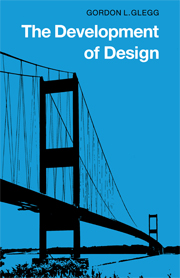8 - To be or not to be
Published online by Cambridge University Press: 07 September 2010
Summary
So far we have been discussing how to go on with research; but we must say something about not going on with it. As we have seen, many successful inventions have been re-inventions; the first attempt at development failed. In my view there are three main causes for such unhappy occurrences.
The first is that you run out of money. You don't decide to stop the development, your bank manager (or his equivalent) does it for you. Perhaps you had forgotten, or never realised, that development costs are always between three and nine times greater than one's initial conservative estimates.
The second reason for failure is that you have too much money. I can hear squeaks of disbelief tinged with envy ringing in my ears. But it is true. True when people imagine that money is a substitute for thought. And they do. Quite often.
In the last war, money was no problem for secret development work. By and large it didn't make it any easier to do; at any rate for me to do. And today big corporations sometimes think that they can flatten awkward development hurdles by mere money, and when they see they can't, they snatch all the money away again in a huff. I must repeat, there is no substitute for thought.
- Type
- Chapter
- Information
- The Development of Design , pp. 72 - 73Publisher: Cambridge University PressPrint publication year: 1981

